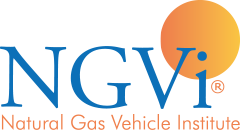By Kasia McBride, Marketing Manager, NGVi
This year, NGVi attended the ATMC Annual Conference, the premier event for the auto and truck training industry, organized by the Automotive Training Managers Council (ATMC). ATMC, a non-profit organization, is designed to promote the advancement of training and professional development within the automotive service industry. The organization’s members are comprised of original equipment manufacturers (OEMs), aftermarket suppliers, fleets, government/utility companies, training organizations, and others.
With the goal of better understanding the training needs of its members, ATMC has been conducting benchmark surveys each year, and results are presented at the annual conference. This year there were approximately 2,200 people who completed the survey. About 60.41% of responses came from repair technicians, followed by shop managers and owners (26.91%), parts distribution representatives (5.68%), service advisors (4.64%) and collision repair technicians (2.36%). Individuals were asked to evaluate their own needs for technician training as well as share their preference regarding the training delivery methods.
Here are some results of the survey:
More than 25% of responders identified compressed natural gas (CNG) fuel systems as a training need.
Two thirds of responders have recognized deficiencies in their knowledge and skills required for their job.
More than 35% said that they do not have access to the training they need, and cited the following factors:
Availability of the right training (72.27%)
High cost of training (47.7%)
Lack of quality training (46.52%)
Inability to take time off from work (36.93%)
Excessive travel distance (33.9%)
Of those who participated in training over the last year, approximately 35% received instructor-led training, whether classroom or lab-based.
Asked about their preference regarding the delivery methods, the majority of technicians (~65%) chose instructor-led training over other methods.
Management level responders, however, preferred e-learning option for their technicians.
For the NGV industry, perhaps the most important finding from this report is the high percentage of technicians identifying the need for CNG training. As more NGVs are on the road, maintenance technicians who will service and repair these vehicles must be trained on how they work. Adequate technician training, sadly often overlooked by many organizations, is critical because natural gas has different chemical properties, is lighter than air, and does not behave like gasoline or diesel.
Safety related training for gasoline and diesel is common, and technicians have learned how to maintain and repair vehicles that operate on those fuels. To safely and correctly maintain NGVs, learning about the fuel and the vehicle technology is crucial too. Servicing NGVs requires technicians to be aware of procedures and repair practices that are unique to these vehicles. Failure to understand how to diagnose technical problems with NGVs can both negatively impact the safe operation of the vehicle and increase the risk of accident both in the shop and on the road.
Another interesting finding from this report is that many organizations have difficulty in identifying the right training provider for their needs. Procuring high-quality training for technicians, controlling costs and finding time for training can be a challenge. There are many factors that need to be considered, from training organization’s credibility, experience, credentials and qualifications of the trainers, to testing methods. The most significant one, however, is the value of the training.
While fleet and dealer service managers want to make sure they get the best quality training for their education budget, they need to realize that the least expensive training does not necessarily mean the most effective training. If the training provider is not knowledgeable or experienced, or does not have enough credibility, technicians who receive the training ultimately won’t have the necessary skills to handle high-pressure fuels. Not understanding how to diagnose technical problems on natural gas vehicles can cost thousands of dollars per vehicle, and inadequate safety training could cost lives.
Choosing the right training delivery method for their technicians is another challenge for fleet managers. While the majority of technicians prefer the instructor-led option, especially when it includes a hands-on portion, managers are looking into less costly options to eliminate travel costs as well as sending multiple technicians to training. For them e-learning is an attractive, cost-effective option.
Choosing between e-learning or instructor-led training is a critical step in training development planning, because management choices can greatly influence how technicians absorb the information. Technicians are historically kinesthetic learners, which means they absorb information better when given the opportunity to actually perform the skills being taught through hands-on exercises. While e-learning can be an effective way to deliver background information or test knowledge, content focused on technical skills call for instructor-led training.
For anyone involved in servicing or managing CNG or LNG vehicles and looking for the best training solution, NGVi has a proven system to assess technician training and certification needs that will help mitigate risk, ensure technician and fleet personnel safety and increase employee confidence and skills. This assessment takes about 30 minutes to complete and is free of charge.
For more information, contact NGVi at 800-510-6484 or info@ngvi.com.
